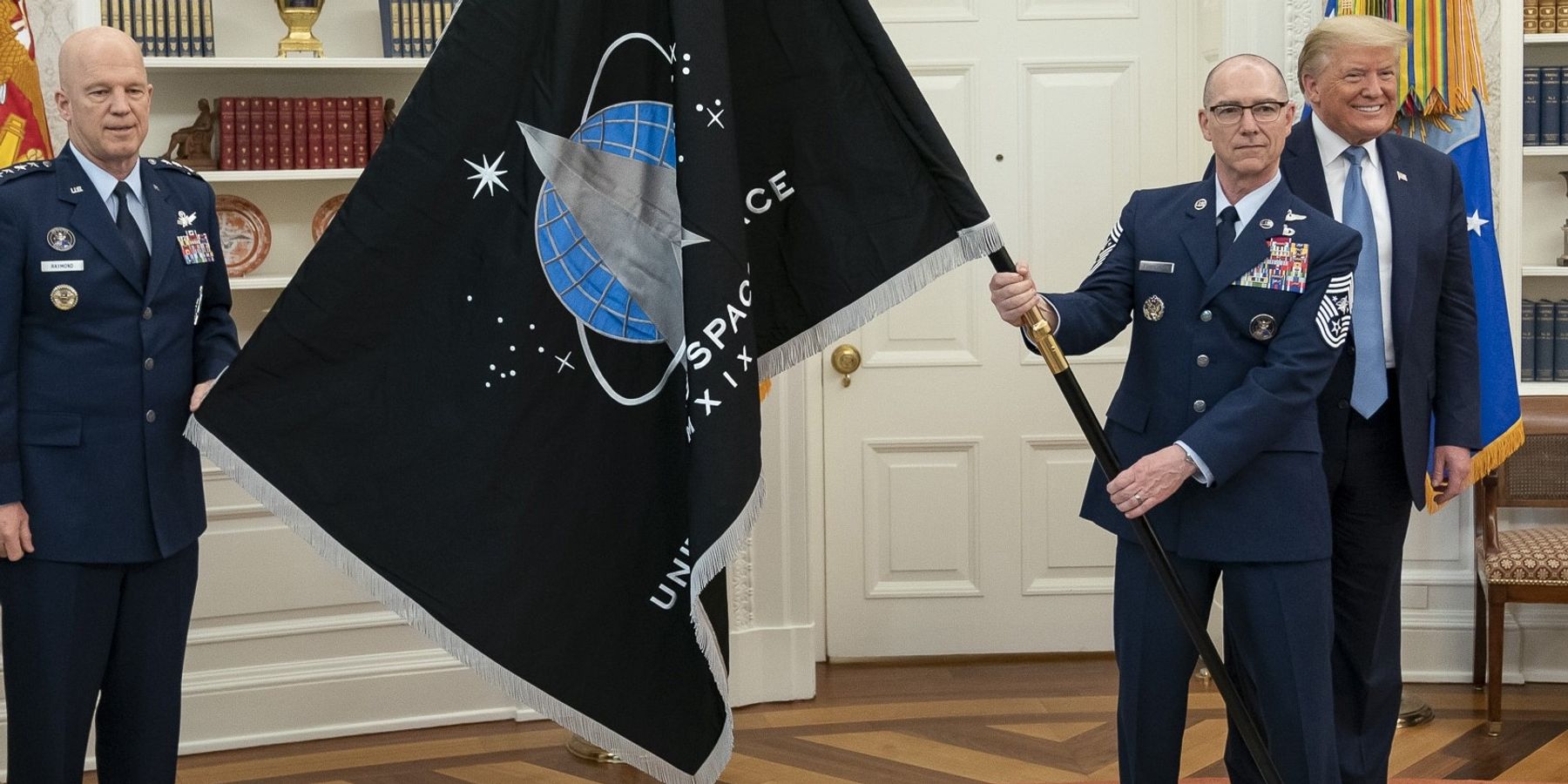Upon its creation as part of the Department of the Air Force in 2019, the U.S. Space Force, whose mission was previously described on its website as being “focused solely on pursuing superiority in the space domain,” was often a subject of ridicule.
Mocked on Saturday Night Live, the Space Force’s logo has been called an “obvious Star Trek knockoff.” In 2021, Politico reporter Bryan Bender described the Space Force as “still mired in explaining to the public what it does.” The Force even inspired a short-lived satire series on Netflix.
Despite a rough start, Space Force has persisted, almost doubling its annual funding since its creation. It has its own network of satellites to boot. And now, Air and Space Force leadership is pushing for more funds and resources in an increasingly militarized space domain. With their founder President Donald Trump returning for a second term, the skies, it would seem, are no limit.
Proponents say Space Force expansion is key to maintaining American military superiority as space becomes the new military frontier. But ramping up Space Force investment and growth in the name of power competition could ultimately promote an unpredictable, perhaps dangerous, militarization of space amid already tenuous geopolitical conditions.
Space and Power Politics
According to now-departed Air Force Secretary Frank Kendall, the Space Force needs to “expand to several times its current end strength.” To this end, Kendall wrote in a report last month that “major and transformative investment” in the Space Force is required to ensure adequate robustness for geopolitical challenges ahead.
“Space is going to be the decisive [geopolitical] domain,” Kendall explained in a recent talk, which highlighted his report, at the Center for Strategic and International Studies. “The ability of the entire joint force to project power depends upon our success in space.”
Critically, the perceived Russia and China threats are front-and-center in Kendall’s calls to bolster the Space Force.
War between the U.S. and China and/or Russia “can happen at any time, even if the probability is only five or 10 percent. You've got to take that seriously, and…deterring that is the reason we have an Air Force and Space Force,” Kendall said at CSIS. “And winning, if we get into a fight, is the reason we have the Air Force and Space Force.”
Highlighting adversaries’ bolstered capacities, Kendall posited in his report that China was working to utilize emerging technologies, especially air and space technologies, “to defeat the United States in the Western Pacific.”
But Kendall’s push to bolster U.S. space military capabilities, coupled with frequent discussion of China and Russia as threats, rather than as parties to find common ground with, stirs the pot when relations are already weak.
“I think any militarization of space is undesirable, to be honest. I think we have enough militarization on earth, we don't need to also expand it to new domains,” Jennifer Kavanagh, Senior Fellow and Director of Military Analysis at Defense Priorities, told Responsible Statecraft. “Rather than trying to out-compete China and Russia by militarizing space more than [them], I would push for…a real concerted effort at some kind of arms control regime to put the militarization of space off the table.”
“It would require going to the negotiating table, willing to give things up,” Kavanagh said. “I don't see [doing so] as a weakness. I see it as a smart and a smart investment in diplomacy to prevent a militarized outcome that is undesirable.”
Looking ahead
Kendall has called for increased Space Force capacities to ensure U.S. space superiority; a new Trump administration appears likely to follow suit.
Namely, President Trump has tapped Troy Meink, principal deputy director for the National Reconnaissance Office, which operates spy satellites, to replace Kendall as U.S. Air Force head. Noting Meink’s close work with the Space Force at the NRO, Breaking Defense reporters Michael Marrow and Theresa Hitchens wrote the appointment signaled space “will be a focus for the next administration.”
Like predecessor Kendall, Meink has played up the threats posed by China and Russia in space. “It’s…very concerning that the Russians may be considering the incorporation of nuclear weapons into their…counter space systems,” Meink remarked at a talk held by the Mitchell Institute for Aerospace Studies last year, parroting vague U.S. allegations made last year about possibly nuclear Russian space capabilities.
“China is looking to deny our ability to operate in…space, creating a heightened threat environment. They are also building proliferated architectures of their own,” Meink explained. “That is a big challenge for us to stay ahead of.”
Trump vowed last year to create a “Space National Guard” if re-elected, which he said would act as “the primary combat reserve of the U.S. Space Force.” Upon taking office, he even called for sending astronauts to Mars, saying "we will pursue our Manifest Destiny into the stars."
“Our military budget is already almost $1 trillion,” said Kavanagh. “It is a hard sell for me…that we need to do something that's going to increase the force structure of an already too big military.”
Zooming out, Kavanagh challenged the need for U.S. space superiority, an idea those at Space Force have repeatedly pushed, as a prerequisite for U.S. security.
“The U.S. does need space assets and space capabilities to be able to project power in ways that defend the homeland,” Kavanagh explained. But that “the U.S. may need to be dominant in space if it wants to maintain unmatched global military primacy… it is clear to me [this primacy] is not a good goal...is not the goal the US should be aiming at.”
- Not enough war on the ground, the US is taking it to space ›
- Space Force wants to 'Fly Me to the Moon' ›
- Pentagon stops being coy about space war | Responsible Statecraft ›
- For Washington, China space war isn't a matter of 'if' but 'when' | Responsible Statecraft ›
- Mitchell Institute: We 'need' 300 F-47s and 200 B-21s! | Responsible Statecraft ›
















